Iraqis returning to their country after years abroad often face challenges finding employment opportunities or opening businesses. A series of trainings from the Achieving Measurable Access to Livelihoods (AMAL) program, implemented by Deutsche Gesellschaft für Internationale Zusammenarbeit (GIZ) GmbH and Blumont, is helping returnees and disadvantaged groups learn essential business and vocational skills so they can join the Iraqi workforce.
The program gives particular focus to private sector vocations and in-demand trades such as plumbing, carpentry, air conditioning repair, video editing and photography, sewing, hairdressing, handicrafts, electrical repair, and mobile phone and computer maintenance.
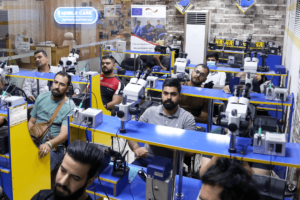
The AMAL vocational trainings help trainees acquire technical skills, abilities, and knowledge in a specific trade.
Activities provide returnees and people from underserved groups (like persons with disabilities and women) with participatory training in either business development or a specific trade, as well as access to mentor support and in-kind materials to jumpstart their careers.
The five-day business training walks participants through the basics of entrepreneurship, market assessment, marketing, budgeting, and planning.
The vocational trainings are hands-on, helping trainees acquire technical skills, abilities, and knowledge in a specific trade over five to ten days.
In both Erbil and Baghdad, each participant brings their own hopes for starting a business or a new vocation.
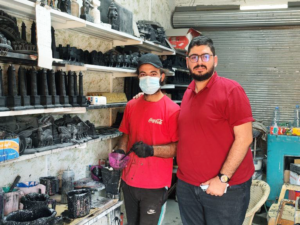
Hussein, right, runs a souvenir business in Iraq that sells miniatures of historic sites.
Hussein
While living abroad in Germany, Hussein and his family thought a lot about their Iraqi homeland and its beautiful, historic sites. This sparked an idea to make miniature versions of landmarks and sell them as souvenirs.
When he returned to Iraq, Hussein learned about the AMAL business training through a friend. He hoped the training would help him get his business off the ground and compete with other souvenir producers while preserving cultural history.
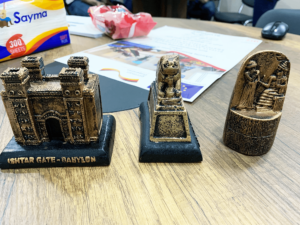
Hussein’s hope is to be able to compete with other souvenir companies, all of which are not local, like his.
“Our country has a lot of great heritage sites, and I thought it would be of great importance to create locally made miniature versions of those sites and present them with pride,” he said.
During the five-day training, Hussein learned management and economic skills that helped him set a foundation for his business. “The training was very useful for me,” he said. “I got a lot of great marketing ideas. Since we are the only ones making souvenirs of this quality locally, we want to be able to compete with imported items.”
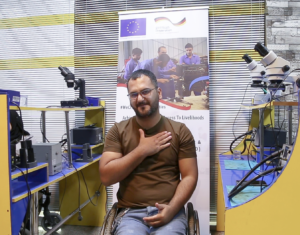
Nooraddin took a training in electronics maintenance so he could open his own mobile phone repair shop.
Nooraddin
Nooraddin, who has a physical disability, joined the AMAL vocational trainings to learn more about software and hardware maintenance. He dreamed of running his own mobile electronics maintenance shop and had already found a storefront to work from. However, Nooraddin felt that he needed proper training to start his business and best serve customers.
Now, equipped with the skills to fix electronics, as well as the welding and maintenance tools he the work requires, Nooraddin can confidently operate his business. “There are limited job opportunities for people with special needs like me,” he said. “Working in electronics maintenance is something I can do using my brain and my hands.”
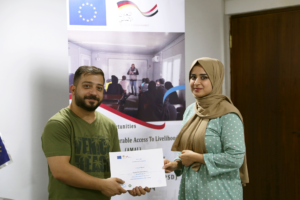
Shayma, right, earned a certificate in basic business skills, which will support her endeavor to open a store.
Shayma
Shayma and her husband migrated to Finland years ago but decided to return to their homeland and build their future among their loved ones. With encouragement from her family, Shayma decided to open a shop to sell mobile phones.
Through the AMAL program, Shayma developed the knowledge she needed to build her new business. She learned a lot about promoting her shop in a crowded and competitive market. “I didn’t know how to expand my business or deal with the customers before, but now I have learned a lot and I am able to be confident in my ability to succeed,” Shayma said.



